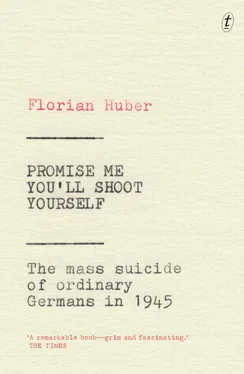The Kuhlmanns, Else and several others, among them Else’s future husband, spent the hours leading up to the invasion in the cellar, taking with them food, bedclothes and their valuables. In the early afternoon, Erich Kuhlmann saw the first Russian soldier and hoisted a white flag. In this part of Demmin, tucked away on a wooded hillside next to the cemetery, a little way from the old town, the invasion went off peacefully. A few Russians demanded their watches and schnapps. One or two wanted medical treatment and had Dr Kuhlmann minister to them. In the cellar, Else laid the table for dinner. It looked as if Werner and Ilse’s parents might be right after all. The doctor and his wife took their bedclothes and carried them back up to their room. Their daughter and the maid thought about sleeping in the attic, but couldn’t find a good place to hide and decided to remain in the cellar.
That night they heard strangers’ voices overhead and the tramp of boots. Their faint hope was dashed in a moment. Else described for Werner how they had squeezed themselves into the darkest corners of the cellar, terrified:
We immediately started shaking and trembling again from head to foot. Upstairs we heard several heavy footsteps—they even came as far as the cellar stairs, but no further. By the time things went quiet up there, we’d been trembling for a good hour.
When the soldiers had gone, Erich and Maria Kuhlmann joined the girls in the cellar. They explained that under the soldiers’ insistent questioning, another tenant, Frau Lorenz, had claimed to be the Kuhlmanns’ daughter, and been raped four times in a row. The doctor and his wife had abandoned all hope of escaping their fate.
Ilse was quite desperate and said to me: ‘It would be best if Daddy just shot us. What’s the point in carrying on playing hide-and-seek like this?’ Then your mother said to me: ‘Else, brace yourself—we’re going to take our lives.’ I didn’t think she was serious and only replied unsuspectingly: ‘You can’t do that! It’s not possible!’
Else failed to hear the note of determination in their words, evidence of a long-hatched plan. Shortly before midnight, Dr Kuhlmann returned to the cellar, two Soviet officers on his heels. The soldiers didn’t stay long. They took two women back upstairs with them—other tenants who had also been hiding in the communal cellar. Everyone knew what was in store for them.
• • •
Since the October Revolution of 1917, Labour Day, held annually on 1 May, had been one of the most important public holidays in the Soviet Union. The Russian soldiers in Demmin knew that on this day all eyes were turned to Berlin, where their comrades from the 1st Belorussian Front were going to destroy the fascist beast in its lair. That year, the May Day celebrations in Moscow, the greatest victory celebrations in the history of Russia, were held to honour the heroes who had taken Berlin. No one was interested in Demmin. But the soldiers wanted a May Day of their own all the same.
The officers sat in the vicarage’s easy chairs by candlelight, drinking wine from the vicar’s cellar out of large preserving jars. The delicate wineglasses Maria Buske had offered them were too small for the Russians. They knocked back jar after jar. On the other side of the room, as far away from the easy chairs as they could get, the family lay huddled up against the wall. ‘We cowered there on the rug,’ Maria Buske said, ‘a big bundle of fear.’
The officers asked them—the vicar’s wife and children, the grandparents and other relatives—to join in their celebrations. They wanted the grandfather to make music, to play their Russian songs on the piano for them to sing along to, in celebration of their victory over Germany, the end of the war, their liberation from the Nazis, the big May Day holiday. But the family lay there, clinging to each other, too tense to move or speak. The grandfather didn’t know any of the songs the officers wanted to hear. Maria’s son, Norbert Buske, never forgot that night: the victors by candlelight with their preserving jars full of wine, the family on the floor in front of them, and his own flickering fear.
On the night of 30 April, Demmin’s fate was sealed. Apart from a handful of advance troops, no Soviet unit had managed to make it across the Peene. The tanks, armoured personnel carriers, antiaircraft gun carriages, trucks and vast quantities of military equipment transformed the town into a seething army camp. Hundreds of soldiers, checked in their march of victory, swarmed out in search of watches and jewellery, schnapps and women, fun and lust and violence.
They found the ammunition depots; they found the schnapps distillery. Some of them swallowed anything that burnt their gullets and smelt of rotgut. Their feeling of triumph at the imminent victory over the Nazis was heightened by the general May Day merriment. That night, the first houses in Demmin went up in flames.
Deep in the undergrowth of Deven Wood, in among the firs and bushes, Marie Dabs spent the night out in the open with her children, Otto and Nanni, and a few other displaced people. She remembered the happy Sundays of her childhood, when she had strolled through Deven Wood with her parents in a white knitted dress and floppy hat. Now all they had were the clothes on their backs. Even the big suitcase containing the children’s photo albums had been left somewhere along the way. Only that morning she’d been in her fur shop on Demmin’s main shopping street; right up to the end she’d refused to believe that all that was in jeopardy, already as good as lost. She hadn’t realised that she’d swallowed the lies fed to her by party, government and army officials—swallowed their words and made them her own. Now here she was with what little was left to her, on a dank bed of moss in a dark wood.
It was a cold and dreadful night that we spent on the bare forest floor… I had one of my fur coats with me, and my eiderdown, so I was able to cover up the children. In the distance we heard the screams of women being tortured and raped, and saw the first glow of fire above the burning town.
The fires spread until morning, destroying large swathes of the old town. The closely built half-timbered houses with their wooden window frames, rafters, workshops and sheds fed the flames all through the night, and the fire ate its way from house to house and street to street. There was no water in the pipes. People with a few buckets of water to hand tried to protect their houses by laying wet towels on the windowsills and roof beams—damp cloths to hold back a sea of flames.
The fire brigade didn’t turn out, because it couldn’t, or because it wasn’t allowed to. Afterwards there was much dispute over what or who had started the inferno that was to scar the old provincial town forever. Some suspected that arson—even medieval-style torching and pillaging—had been carried out at the behest of Soviet military leadership as punishment for the brief skirmishes when the town was captured. Others believed that isolated fires had been started by the Soviets in the houses of well-known local Nazis and got out of control. Others again wondered whether it had actually been the Soviets at all, given that burning down the town served no military purpose.

Luisenstrasse and Luise Gate after the fire
When Ursula Strohschein and her mother stepped out of the cellar into their yard outside Luise Gate in the morning, after a night broken by screams, they sensed that a few smashed windowpanes would not be the last of it. They thought of the angry commissar who had searched their house—and of the strange black circles the Russians had painted on the doors.
Читать дальше













